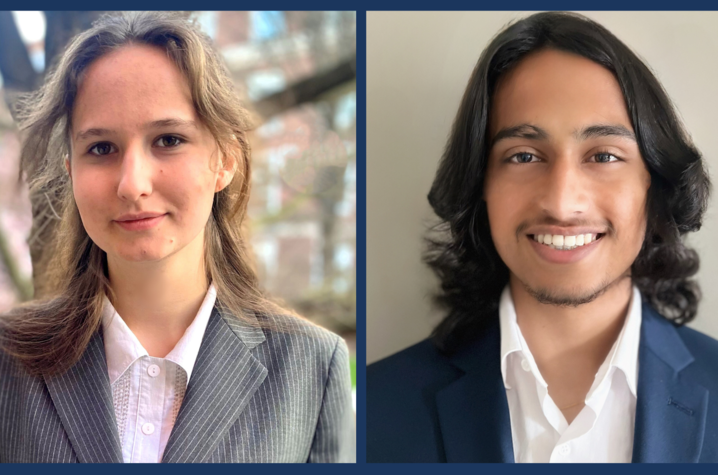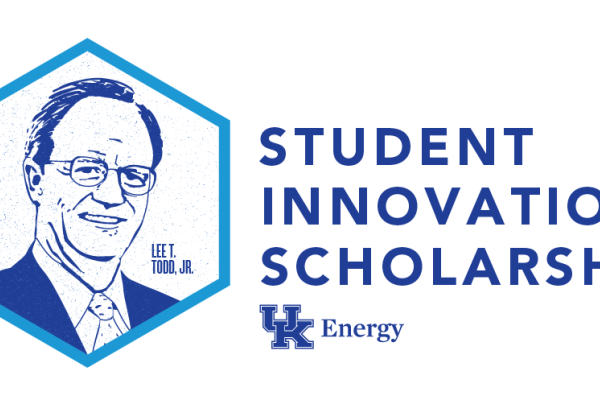2 UK undergraduate students named Beckman Scholars

Two undergraduates have been selected as recipients of the University of Kentucky’s Beckman Scholars Program, titled Scholars United by Chemistry: Cultivating Excellence through Science Stewardship (SUCCESS).
The Beckman Scholars — Elizabeth Elliott, a biology major and chemistry minor in the College of Arts and Sciences and the Lewis Honors College, and Shasanka Lamichhane, a chemistry major and mathematics minor also in the College of Arts and Sciences — will each begin their independent, laboratory research this summer.
The Arnold and Mabel Beckman Foundation’s Beckman Scholars Program is a 15-month mentored research experience for exceptional undergraduate students in chemistry, biological sciences and interdisciplinary combinations. UK was selected as one of 14 institutions nationally to receive the award in 2022.
A highly multidisciplinary program, SUCCESS is built on the cornerstone of chemistry as the central science that unites UK’s Research Priority Areas, established to serve the pressing needs of Kentuckians and the nation.
Elliott will investigate the effect of ion channel misexpression on membrane potential and relationship to temperature and extracellular ion concentration within fly models in the lab of Robin Cooper, Ph.D., professor in the College of Arts and Sciences Department of Biology. Ion channel misexpression can lead to fetal miscarriage, deaths in infants and adults, developmental abnormalities, cystic fibrosis, autism, epilepsy, cardiac diseases and cancer.
“Given how committed the SUCCESS program is to serving Kentucky’s practical needs — including those connected to neuroscience — participation in the program will help move me toward my goals of improving the quality of health care available to contemporary patients through research,” said Elliott.
When not in the lab, Elliott can be found looking for ways to serve and improve her community. From helping a non-native English speaker prepare for the TOEFL exam, tutoring classmates, training high school students in the lab, and serving on the inaugural board of Aperture (UK’s new peer- and expert-reviewed interdisciplinary undergraduate research journal), Elliott embraces the fact that a community functions thanks to its individuals, but only if all are included and supported.
Lamichhane will investigate the interface chemistry of metal-organic frameworks (MOF) in contact with electrolyte solutions, materials that are of interest for energy generation and storage, in the lab of Chad Risko, Ph.D., professor in the College of Arts and Sciences Department of Chemistry.
“Becoming a Beckman Scholar will be a great stepping stone for me toward my goal of becoming a professor,” Lamichhane said. “SUCCESS allows me to bring my unique perspectives and creative insights into novel problems as I continue to develop as an independent researcher and will allow me to expand my scientific repertoire helping me further explore the diverse, and interdisciplinary landscape of chemistry.”
With a focus on service and accessibility, Lamichhane serves his community as a volunteer at the American Cancer Society’s Hope Lodge, producing YouTube chemistry tutorial videos to help make STEM education accessible to people of all backgrounds and education levels and a resident assistant at a dementia unit.
As Beckman Scholars, Elliott and Lamichhane will receive a total of $21,000 over 15 months: $18,200 for a student stipend and $2,800 to support scientific supply and travel for current research activities. Faculty mentors will also receive $5,000 to support educational expenses.
Each Beckman Scholar will perform research activities part-time during one academic year and full-time over two consecutive summers. They will also complete a required training and professional development series, and at least one outreach or service activity during the academic year. Scholars will participate in leadership workshops, present at the UK Showcase of Undergraduate Scholars in April 2025, and attend one Beckman Scholar Symposium.
More from this series Undergraduate Research
Credits
Jesi Jones-Bowman (Office of Undergraduate Research)



